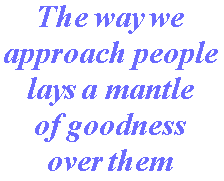For Goodness’ Sake
— by Marilyn Duff
Her words washed over me. I let them sink in.
My mother believed that I was good!
The sound of their voices caught my attention. It was a
warm summer evening, and my parents were outside, sitting on the front
porch, talking quietly. Something made me know they were talking about
me. I couldn’t help listening.
“You’re going to have to keep an eye on her,”
my father was saying, “or she’ll get in trouble.”
I was just fifteen, and boys were starting to come calling. He was nervous.
 Silence
ensued, except for the creak of the old glider they sat on. Then my mother’s
voice came firmly. “But Marilyn’s a good girl,”
she said. “She’ll be okay.”
Silence
ensued, except for the creak of the old glider they sat on. Then my mother’s
voice came firmly. “But Marilyn’s a good girl,”
she said. “She’ll be okay.”
Her words washed over me. I let them sink in. My mother
believed that I was good!
She didn’t know that I was listening, and that made
her declaration of my goodness all the more powerful. It filled me with
warmth, happiness and love for her.
Throughout my teen years, my behavior was often directly
affected by her words and the expectations she had of me. She had scripted
me for goodness, simply by saying that I was.
 I
believe everyone wants to be thought of as “good” by others.
And if you can convince someone that you perceive him or her as good,
you are giving a priceless gift. But believing in the innate goodness
of human beings is not easy. The horrible stories of man’s inhumanity
to man surround us in newspapers, TV and films.
I
believe everyone wants to be thought of as “good” by others.
And if you can convince someone that you perceive him or her as good,
you are giving a priceless gift. But believing in the innate goodness
of human beings is not easy. The horrible stories of man’s inhumanity
to man surround us in newspapers, TV and films.
Further, if we’ve experienced rejection, continual
criticism or abuse, it can leave us with a fear of closeness and paranoia
about what others think of us. We may feel so insecure that we unwittingly
send a message of distrust or dislike to others.
On the other hand, lighting up when we see someone come into a room, greeting them with a smile, laying a hand on their shoulder — all are affirming their goodness. Listening when someone talks, calling to see how they are, or jotting a note of concern when they’ve had bad luck—all are saying, “You’re a good person.” Even smiling and being pleasant to a checkout girl at the supermarket is sending a message that you believe in her goodness.
Trusting
Trusting another is also a way to project a sense of their innate goodness.
When I was a high school teacher, a boy named Mark arrived late to class
the first week of school with a scowl on his face and a surly attitude.
I smiled, welcomed him to class, gave him a textbook, and assigned him
a desk. He slumped in his chair, crossed his arms and refused to open
the book, glowering at me, challenging me with his eyes. His open hostility
was apparent.
 After
class I talked to his counselor. Mark had been in trouble all his life,
in school as well as out. He had a police record. He was on probation
for stealing a car. I’d have my hands full with him, she warned.
The next two days I pondered what to do, as Mark continued to refuse to
read or take part in class in any way.
After
class I talked to his counselor. Mark had been in trouble all his life,
in school as well as out. He had a police record. He was on probation
for stealing a car. I’d have my hands full with him, she warned.
The next two days I pondered what to do, as Mark continued to refuse to
read or take part in class in any way.
By the third day, as the class was reading an assignment
quietly and Mark was pointedly flipping a paper clip instead, I was seriously
considering banishing him from my class for good. But then I remembered
Mother’s lesson. How could I convince him that I knew he had
good in him? I had an inspiration. I removed my car keys from
my purse. “Mark? May I see you for a minute?” I said,
beckoning him forward.
Insolently, and obviously spoiling for a confrontation,
he dragged himself to his feet and worked his way up the aisle. The kids
watched with interest. Instead, I sorted through the keys, found one and
extended the bunch to him.  In
a stage whisper, I said, “I left some books in my trunk. Could
you go out to the faculty parking lot and get them for me? And take this
pass,” I added. “I wouldn’t want you to get in trouble.”
The class watched, incredulous.
In
a stage whisper, I said, “I left some books in my trunk. Could
you go out to the faculty parking lot and get them for me? And take this
pass,” I added. “I wouldn’t want you to get in trouble.”
The class watched, incredulous.
Mark said, “Sure,” and rolling his eyes meaningfully
at them, he took the keys from my hand. As he sauntered toward the door,
they egged him on. “See you around!” “Be sure to write!”
“We won’t see YOU again!”
“O.K., class, settle down, please! You’ve got
your assignments. Let’s get back to them,” I said, feigning
nonchalance. The next five minutes were among the longest in my life.
Several times I glanced surreptitiously at the clock. What if he took
the car? What if he went joy riding and, horrible thought, got hurt?
Finally I heard footsteps outside. My heart was pounding.
The door opened. It was Mark with a stack of books in his arms. He walked
up the aisle, set them on my desk, and returned my keys. I smiled and
thanked him. He took his seat. I bent over my work. When I stole a glance
a few  minutes
later, he was watching me with interest. I smiled at him and tapped an
imaginary book on my desk to indicate that he should be reading. He smiled
back, and for the first time, opened his book. From then on, Mark was
my friend and a student who joined in the class and even began to read
library books on his own.
minutes
later, he was watching me with interest. I smiled at him and tapped an
imaginary book on my desk to indicate that he should be reading. He smiled
back, and for the first time, opened his book. From then on, Mark was
my friend and a student who joined in the class and even began to read
library books on his own.
I wish I could say that I changed his life, but I can’t
be sure. He transferred to another school before the year was out, and
I don’t know what became of him. But I saw in his eyes that day an
understanding of what I had done, and why I had done it. He knew the risk
I’d taken. And I believe that I gave him a chance to experience his
own goodness. I hope that he remembered it.
Our expectations of others are mirrored in our faces, transmitted in our eyes, sent in our voices. The way in which we approach people lays a mantle of goodness over them. In their feelings of worthiness, they may go out and touch others with goodness as well. We may never have a chance to do great deeds in the name of God, but if we can remember to affirm someone’s goodness every day, we have done God’s work on earth.
Return to Care Capsule Front Page